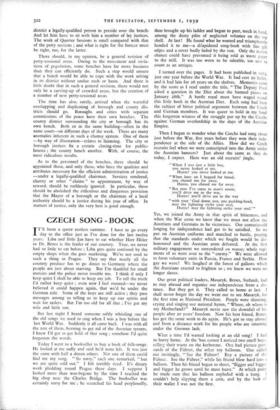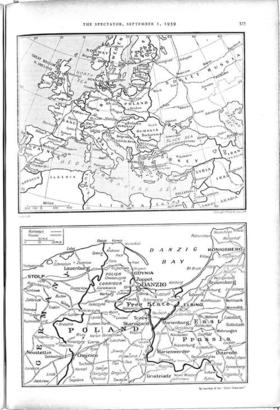CZECH SONG - BOOK
T T'S been a queer restless summer. I have to go every .1. day to the office just as I've done for the last twelve years. Liba and little Jan have to eat whether Herr Hitler or Dr. Benes is the leader of our country. True, we never had so little to eat before ; Liba gets quite confused by the empty shops when she goes marketing. We're not used to such a thing in Prague. They say that nearly all the country produce has to go direct to Germany where the people are just about starving. But I'm thankful for small mercies and the police never trouble me. I think if only I keep quiet I shall be able to keep my job. To tell the truth I'd rather keep quiet ; even now I feel stunned—we never believed it could happen again, that we'd be under the German rule. Some of the boys are still active ; they pass messages among us telling us to keep up our spirits and wait for orders. But I'm too old for all that ; I've got my wife and little son.
But last night I heard someone softly whistling one of the old songs we used to sing when I was a boy before the last World War. Suddenly it all came back. I was with all the rest of them, burning to get rid of the Austrian tyrants. I knew I'd got to get hold of that song ; somehow I'd quite forgotten the words.
Today I went to a bookseller to buy a book of folk-songs. He looked at me sadly and said he'd none left. It was just the same with half a dozen others. Not one of them could find me my song. " So sorry," each one remarked, " but we are quite sold out." I felt terribly tired. It's dreary work plodding round Prague these days. I suppose I looked more than woe-begone by the time I reached the big shop near the Charles Bridge. The bookseller was certainly sorry for me ; he scratched his head perplexedly, then brought up his ladder and began to peer, torch in hand, among the dusty piles of neglected volumes on the top shelf. At last! He found what he wanted and triumphantly handed it to me—a dilapidated song-book with fine gilt edges and a cover badly faded by the sun. Only the merest chance could have prevented it being sold as waste paper to the mill. It was too worn to be saleable, too new to count as an antique.
I turned over the pages. It had been published in 1913, just one year before the World War. It had cost 20 heifer, and it had lain for 26 years on the shelves. Memories came by the score as I read under the title, " The Deputy Fresl asked a question in the Diet about the banned pieces on January 28th." A battle royal must have waged round this little book in the Austrian Diet. Each song had been the subject of bitter political argument between the Czech and German members. It was queer to hold in my hand this forgotten witness of the struggle put up by the Czechs against German overlordship in the days of the Austrian Empire.
Then I began to wonder what the Czechs had sung about just before the War, five years before they won their inde- pendence at the side of the Allies. How did we Czech recruits feel when we were conscripted into the Army under the Austrian banners? Just about the same as they do today, I expect. Here was an old recruits' jingle.
" When I was just a little boy, you never 'coked at me, Huzza! you never looked at me.
" When later on I begged for bread, you chased me far away, Huzza, you chased me far away.
" But now I've come to man's estate, you'll drive me to the war, Huzza! you'll drive me to the war " with your 'God damn you, you pudding-head, may the lightning strike your soul, Huzza! may the lightning strike your soul.'"
Yes, we joined the Army in that spirit of bitterness, and when the War came we knew that we must not allow the Austrians and Germans to be victorious. Our centuries-old longing for independence had got to be satisfied. So we put on Austrian uniforms and marched to battle, praying that the standards under which we fought would be dis- honoured and the Austrian arms defeated. At the first military engagement we surrendered en masse; whole regi- ments of us went over to the " enemy." We were allowed to form voluntary units in Russia, France and Serbia. How gay we were! We laughed at the forest of gallows which the Austrians erected to frighten us ; we knew we were no longer slaves.
Our great political leaders, Masaryk, Benes, Stefanik, had to stay abroad and organise our independence from a dis- tance. But they got it. They called us home at last. I shall never forget the day we went out to see Masaryk, for the first time as National President. People were shouting, crying and singing our national hymn, " Where, oh where is my Motherland?" Masaryk never saw the downfall of his people after 20 years' freedom. Now his best friend, Benes, has got the same work to do again. He's got to stay abroad and from a distance work for his people who are smarting under the German lash.
What a time I'd wasted looking at an old song! I had to hurry home. At the 'bus corner I noticed two small boys, selling their wares on the kerbstone. One had picture post- cards of the Fiihrer, the other toy balloons. One called out invitingly, " See the Fiihrer! Buy a picture of the Fiihrer. See the Fiihrer," while his friend blew hard into a balloon. Then his friend began to shout, "Bigger and bigger and bigger he grows until he must burst." At which point he made sure that his balloon exploded with a bang. I couldn't help slipping them a coin, and by the look of their wallet I was not the first.



































 Previous page
Previous page